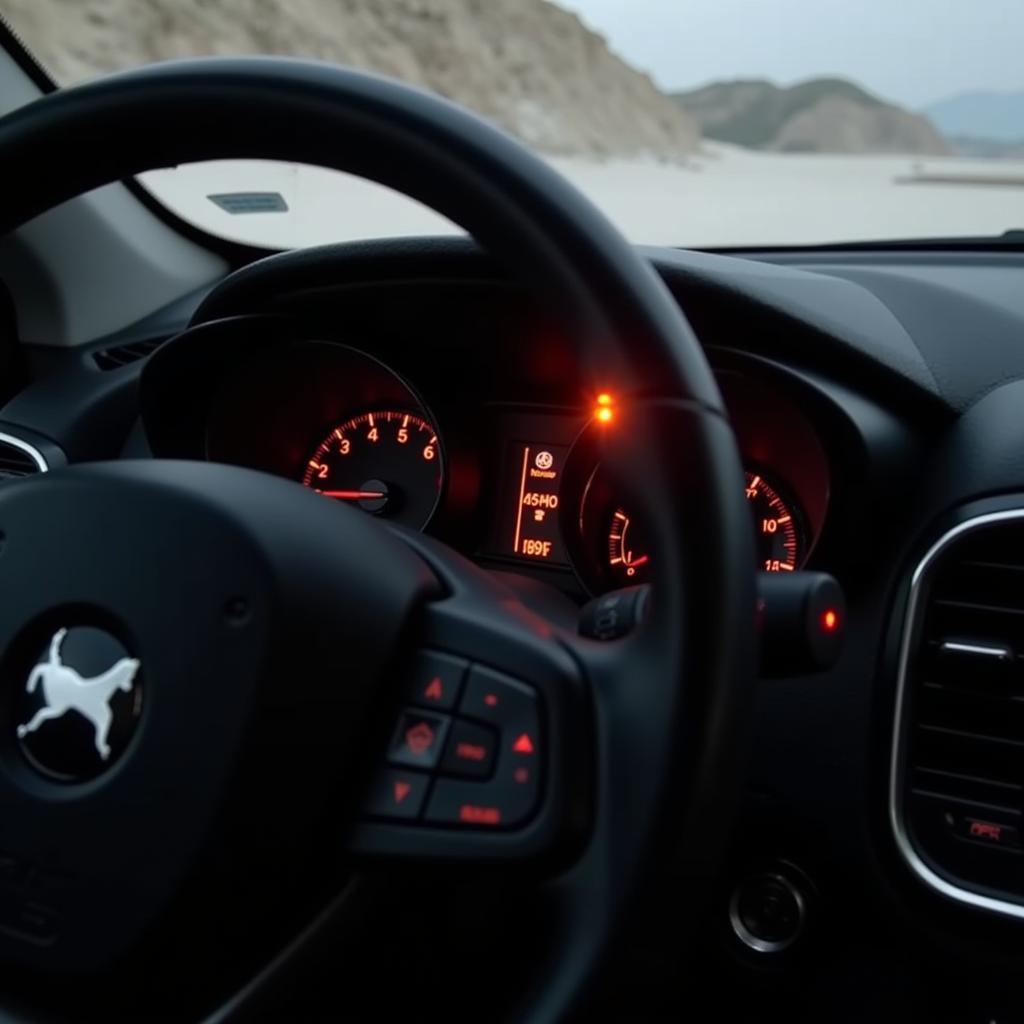The electric park brake warning light on your dashboard can be a source of anxiety, signaling a potential issue with your vehicle’s braking system. This article provides a comprehensive guide to understanding, troubleshooting, and resolving problems related to the electric park brake warning light. We’ll explore the common causes, diagnostic procedures, and potential solutions, empowering you to address this issue effectively. After reading mini brake pad warning light reset, you’ll be equipped to tackle this issue head-on.
Understanding the Electric Park Brake System
The electric park brake, unlike traditional hand-operated or foot-pedal parking brakes, utilizes an electronic system to engage and disengage the parking brake. This system offers several advantages, including increased safety, improved hill-hold functionality, and a cleaner cabin aesthetic. However, like any electronic system, it can be susceptible to malfunctions.
Common Causes of the Electric Park Brake Warning Light
The illumination of the electric park brake warning light can be attributed to various factors. These include:
- Low Brake Fluid: Insufficient brake fluid can trigger the warning light.
- Faulty Brake Pad Wear Sensor: A malfunctioning sensor can incorrectly signal worn brake pads.
- Malfunctioning Electric Park Brake Switch: A faulty switch can prevent proper engagement or disengagement of the park brake.
- Wiring Issues: Damaged or corroded wiring within the park brake system can disrupt communication.
- Control Module Problems: Issues with the electronic control module responsible for the park brake can lead to malfunctions.
 Electric Park Brake Warning Light Illuminated on a Car Dashboard
Electric Park Brake Warning Light Illuminated on a Car Dashboard
Diagnosing the Problem
Diagnosing the root cause of the electric park brake warning light requires a systematic approach. It often involves a combination of visual inspection, diagnostic tools, and troubleshooting steps.
Visual Inspection
Begin by visually inspecting the brake fluid reservoir. Ensure the fluid level is within the recommended range. Next, check the brake pads for excessive wear. If the brake pads are significantly worn, they may need replacement.
Diagnostic Tools
Using a diagnostic scanner can provide valuable insights into the specific fault codes stored in the vehicle’s computer. These codes can pinpoint the source of the issue, enabling more efficient troubleshooting.
Troubleshooting Steps
If a faulty switch is suspected, try engaging and disengaging the electric park brake multiple times. Listen for any unusual noises or resistance. If wiring issues are suspected, a thorough inspection of the wiring harness and connectors is necessary.
“A thorough diagnostic process is crucial for pinpointing the exact cause of the electric park brake warning light,” advises John Smith, Senior Automotive Electrical Engineer at AutoTech Solutions. “A proper diagnosis saves time and money by preventing unnecessary repairs.”
Resolving the Issue
Once the cause of the warning light has been identified, appropriate corrective actions can be taken.
Replacing Worn Components
Worn brake pads, faulty switches, or damaged wiring should be replaced with high-quality parts. This ensures the reliable operation of the electric park brake system.
Addressing Software Issues
In some cases, software glitches within the control module can trigger the warning light. Remote software updates and reprogramming, such as how to reset mini brake pad warning light can often resolve these issues.
Professional Assistance
For complex issues requiring specialized equipment or expertise, seeking professional assistance from a qualified automotive technician is recommended. They have the necessary tools and knowledge to diagnose and repair complex electrical systems.
 Mechanic Repairing the Electric Park Brake System of a Car
Mechanic Repairing the Electric Park Brake System of a Car
Conclusion
The electric park brake warning light serves as an important indicator of potential braking system issues. Understanding the common causes, diagnostic procedures, and potential solutions can empower you to address these issues effectively. By following the guidelines presented in this article and seeking professional assistance when needed, you can ensure the safe and reliable operation of your vehicle’s braking system. Remember to address the electric park brake warning light promptly to prevent further complications.
“Ignoring the electric park brake warning light can lead to more serious problems down the line,” cautions Maria Garcia, Lead Diagnostics Technician at Advanced Auto Diagnostics. “Addressing the issue early on can prevent costly repairs and ensure your safety on the road.”
FAQ
-
What should I do if the electric park brake warning light comes on while driving? Safely pull over to the side of the road and assess the situation. Check your brake fluid level and inspect the brake pads. If you notice any abnormalities, contact a qualified mechanic.
-
Can I drive with the electric park brake warning light on? It’s not recommended. The warning light indicates a potential problem with your braking system. Continuing to drive could compromise your safety.
-
How much does it cost to fix an electric park brake issue? The cost varies depending on the specific problem. Minor issues like a faulty switch might be relatively inexpensive to fix. More complex problems involving the control module could be more costly. For a more specific diagnosis related to Mini Cooper, check resources like 2014 mini cooper brake pad warning light reset.
-
How can I prevent electric park brake issues? Regularly checking your brake fluid level and having your brake pads inspected during routine maintenance can help prevent issues with your electric park brake. For Mini owners, resources like mini r53 brake pad warning light reset can be helpful.
-
Is it safe to reset the electric park brake warning light myself? If the underlying issue is not addressed, simply resetting the warning light will not resolve the problem. It’s crucial to diagnose and fix the root cause before resetting the light. Sometimes, specific resets might be necessary like a mini brake pad warning light reset 2017.
-
What is the difference between an electric park brake and a traditional parking brake? An electric park brake uses an electronic system to engage and disengage the parking brake, while a traditional parking brake relies on a mechanical lever or pedal.
-
Can extreme temperatures affect the electric park brake system? Yes, extreme cold or heat can potentially affect the performance and reliability of the electronic components in the park brake system.
